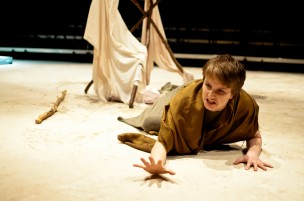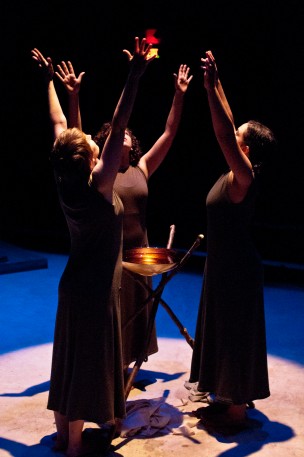
Andrew Ribner/Photography Editor
An anguished voice wails in lament—no words, just cries. This is a voice of true loss: broken, suffering, yearning for a world that has been lost beyond all recovery.
That voice was what greeted spectators at “Lift Your Head,” the senior thesis production in the Theater Department by Sarah Wolfe ’12, which opened last night. Stepping into the ’92 Theater felt like entering a mystical cave. A dim blue light suffused the space, covered in a white groundcloth that somehow reminded me of stone. In the center of the space stood a ritual tripod—three crossed sticks supporting a beautiful brown and gold basin of water—with pieces of cloth scattered about it.
Most striking, however, was the constant wailing.
That lament set the tone for “Lift Your Head,” a three-person adaptation of Euripides’ “Trojan Women,” based on several previous adaptations (including ones by Chuck Mee and Jean-Paul Sartre). Also starring Mica Taliaferro ’12 and Emma MacLean ’14, the piece is one long song of mourning for the death of Troy, as well as the Trojans left to rot there—and for the women, many of whom are left to a fate worse than death: enslavement and abuse, emotional and sexual, by their Greek conquerors. It is not by any means an easy piece, and it is not a happy one, but it is a brutally honest one and holds a story that grabs your attention and refuses to let go.
The women of Troy enter as a trio, singing a haunting spiritual—one of several—in three-part harmony that winds in and around itself. As they move into the opening monologue of the piece, they rapidly transform, becoming three women in conversation, then all the women of Troy, then three lone women, and back again. Finally they ask their question: “What does a woman do, when all the men are gone?”
The answer, in that time (and sometimes in this), is, of course, survive. And that is what

Andrew Ribner/Photography Editor
these three and many—nobly, brokenly, and bitterly—do. All of the performers take a turn in the limelight. Wolfe dominates the piece as Hecuba, former Queen of Troy and the narrative’s focus character. Proud but broken, Hecuba has watched many sons die and now is forced to watch her sisters and daughters be taken by her destroyers. Wolfe is the first performer to burst into classical Greek mourning song for her lost souls, and her singing, lung-shattering and beam-shaking, is at first a shock but quickly assumes awesome proportions.
Taliaferro is a cruel and terrifying Cassandra, capriciously toying with the emotions of both her mother and her people’s captors. Cursed with the gift of foresight but the inability to make herself understood, considered mad until she loses her mind, Cassandra is one of the most poignantly tragic characters in the Western canon. Never having known the touch of a man before as Apollo’s prophetess, she will now be degraded by Agamemnon, leader of the Greeks—but an incident involving a bathtub will fix him, oh yes, it will. Later Taliaferro switches modes and appears as Andromache, the wife of mighty Hector. She has perhaps the hardest lot to bear: kept as chattel by the son of Achilles, she will serve the man who killed her husband, the noblest Trojan alive, perhaps the noblest of all nations. Not only this, but she must witness her only son, Hector’s child, be taken from her breast and thrown from the walls of Troy.
MacLean embodies Helen, in an unusual and poignant take on the character that has become for most people, then and now, an archetype of lascivious irresponsibility. She reminds us that in truth, Helen was raped—and probably not only in the older sense of the word meaning “kidnapped.” “There was no winning for me in this war,” she reminds Hecuba; there was no winning for her in the battles, where she watched uncles and friends kill other uncles and friends, and there was no winning in bed, where she has moved from the couch of one man to another, each of whom has treated her as a prize and little more. A drowning sequence—as Wofle and Taliaferro, the Trojans, curse the source of their misery—is hauntingly beautiful.
The show is not only emotionally gripping, it is poignantly executed as well. The design, by Tessa Young ’13, is simple but evocative, and the script Wolfe has compiled from the other editions of the play flows incredibly well for a conglomerate piece, with beautiful lyric passages on Troy, on war, and on life. The staging—created by the three actors—is also beautiful, with several moments of incredible silent beauty (a particularly poignant moment is Taliaferro rocking back and forth as Andromache with her infant child).
“Troy! I am taking your dust,” the women call as they leave their city. With them goes something beautiful—sad and horrible, but also tragically noble. And as they leave the space, the city’s ghost fills it with the pain of those who once were: empty, mourning, and forever in ashes to blow across the face of the world.
“Lift Your Head” continues tonight and tomorrow at the Patricelli ’92 Theater at 8:00 p.m. Tickets are free and available at the box office on the day of the show, or at the Zelnick Pavilion before the performance.